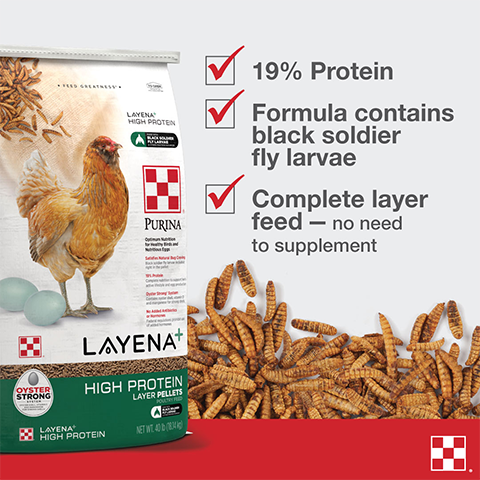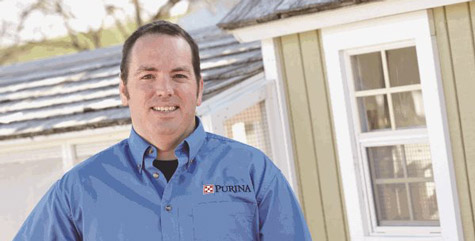
A Guide to Backyard Self-Sufficiency
Starting a Flock : Considering Chickens
“Backyard self-sufficiency” has raised the curiosity of many current – and future – flock owners. With goals of going back to the basics, getting your hands dirty, connecting with your food and checking one less item off your grocery list, backyard chickens are an excellent start point for having more control over your own food supply.
The dictionary defines self-sufficient as: “Needing no outside help in satisfying one’s basic needs, especially with regard to the production of food.”
While some Americans have successfully proven they can live off the land, most of us are just trying to reconnect with the food system and enjoy the rewards of raising healthy animals.
Everyone’s path to backyard self-sufficiency looks different – many families start with vegetable gardens and fruit orchards. They learn to preserve their harvested goods through canning, pickling and drying.
Once they’ve mastered growing plants, many people move on to raising backyard chickens for farm fresh eggs and delicious meat. But a flock is much more than an egg-producing machine, your chickens can help make compost for your plants, hunt for pesky weeds and bugs, and provide hours of companionship.
 umbles or pellets, should comprise at least 90% of their overall diet.
umbles or pellets, should comprise at least 90% of their overall diet.
Wondering how to be more sustainable with your chicken feed? Start with your flock’s protein source. Purina® Layena® High Protein Layer Feed combines grain and black soldier fly larvae, a nutrient-rich insect protein. Insect larvae can reclaim nutrients from once forgotten waste and quickly transform them into high-quality protein. Additionally, the larvae take much less land to produce when compared to typical protein sources. For example, one acre of land (43,560 square feet) can yield about 1,500 pounds of soy in one year. It only takes 65 square feet to produce the same amount of black soldier fly larvae in the same amount of time. Now that’s a sustainable protein source.
Because chicken manure is naturally high in nitrogen (which means it needs to be composted before being used as a fertilizer), setting up a composting system is a great way to break it down into fertilizer for your garden. Composting also transforms wastes such as sawdust, dry leaves, newspapers, vegetable scraps and other compostable materials into valuable organic matter for your garden.
Looking for a natural pest control and weed killer for your backyard? Chickens love eating insects and weeds! Allowing chickens to forage for seeds and bugs will please your garden and flock and provide you an all-natural, sustainable solution for your yard’s pest and weed control needs. But keep in mind “weed” is a relative term to your chickens… What you consider to be a valuable garden plant, they might see as a tasty treat! Fence your garden to protect it from curious chickens.
While backyard self-sufficiency looks different for everyone, raising backyard chickens can bring your path to sustainable living full circle while providing many benefits to you and the environment alike.
Ready to start your journey to backyard self-sufficiency? Download our guide to raising backyard chickens.
The dictionary defines self-sufficient as: “Needing no outside help in satisfying one’s basic needs, especially with regard to the production of food.”
While some Americans have successfully proven they can live off the land, most of us are just trying to reconnect with the food system and enjoy the rewards of raising healthy animals.
Everyone’s path to backyard self-sufficiency looks different – many families start with vegetable gardens and fruit orchards. They learn to preserve their harvested goods through canning, pickling and drying.
Once they’ve mastered growing plants, many people move on to raising backyard chickens for farm fresh eggs and delicious meat. But a flock is much more than an egg-producing machine, your chickens can help make compost for your plants, hunt for pesky weeds and bugs, and provide hours of companionship.
Kicking off your self-sufficiency goals
Raising backyard chickens connects you to your food and offers many benefits to support your self-sufficient lifestyle. Here are a few simple ways to kickstart your backyard self-sufficiency goals:- Reuse: Give empty chicken feed bags a new purpose; sew them into tote bags for garden veggies or turn them into makeshift tarps.
- Share or sell: Have too many eggs in your fridge? Sell or donate them to your neighbors! Farmers markets and community buy/sell social pages are a great place to start.
- Hatch at home: Want to grow your flock? You can buy more chicks or consider hatching eggs at home. Your neighbors and local flock raisers would likely buy extras.
Feeding your flock
A complete chicken feed, such as Purina® Farm to Flock™ 18% Layer, Purina® Layena® Pellets or Crumbles, Purina® Layena® Omega-3, Purina® Layena® High Protein or Purina® Organic cr umbles or pellets, should comprise at least 90% of their overall diet.
umbles or pellets, should comprise at least 90% of their overall diet.Wondering how to be more sustainable with your chicken feed? Start with your flock’s protein source. Purina® Layena® High Protein Layer Feed combines grain and black soldier fly larvae, a nutrient-rich insect protein. Insect larvae can reclaim nutrients from once forgotten waste and quickly transform them into high-quality protein. Additionally, the larvae take much less land to produce when compared to typical protein sources. For example, one acre of land (43,560 square feet) can yield about 1,500 pounds of soy in one year. It only takes 65 square feet to produce the same amount of black soldier fly larvae in the same amount of time. Now that’s a sustainable protein source.
Integrating chickens in the garden
Reducing waste is often associated with sustainability. However, this doesn’t mean physically reducing the amount of poop your flock produces. Composting chicken manure and other wastes can allow you to repurpose products typically viewed as unusable, leading you one step closer to creating “the self-sufficient backyard.”Because chicken manure is naturally high in nitrogen (which means it needs to be composted before being used as a fertilizer), setting up a composting system is a great way to break it down into fertilizer for your garden. Composting also transforms wastes such as sawdust, dry leaves, newspapers, vegetable scraps and other compostable materials into valuable organic matter for your garden.
Looking for a natural pest control and weed killer for your backyard? Chickens love eating insects and weeds! Allowing chickens to forage for seeds and bugs will please your garden and flock and provide you an all-natural, sustainable solution for your yard’s pest and weed control needs. But keep in mind “weed” is a relative term to your chickens… What you consider to be a valuable garden plant, they might see as a tasty treat! Fence your garden to protect it from curious chickens.
While backyard self-sufficiency looks different for everyone, raising backyard chickens can bring your path to sustainable living full circle while providing many benefits to you and the environment alike.
Ready to start your journey to backyard self-sufficiency? Download our guide to raising backyard chickens.





